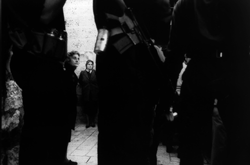These unprecedented actions constitute a significant step in the direction for which the WCC has hoped and prayed ever since it was formed 45 years ago.
For over four decades, the WCC has repeatedly issued calls for good-faith dialogue leading to a peaceful settlement. The V. Assembly (Nairobi, 1975) put it in these words:
Although the parties have not trusted one another sufficiently until now to engage in dialogue, full mutual recognition by the parties must be seen not as a precondition to, but rather as a product of the negotiation. We call upon all parties to take those steps essential to negotiations with hope for success. Among these steps, we emphasize the cessation of all military activity, both regular and irregular, including terrorism.
For the breakthrough achieved in the present negotiations, and for the wisdom and patience of the mediators, we give thanks to God.
Important as it is, however, this agreement does not yet ensure peace, nor does it guarantee justice. On both sides, serious, even potentially violent divisions remain as a result of the concessions that have been necessary to reach an accord.
Implementation is the key. The "Declaration of Principles" subscribed by the leaders of the PLO and the State of Israel does constitute a commitment to continue negotiations whose goal is the implementation of UN Security Council resolutions 242 and 338, which by international consensus lay out the fundamental conditions for security, lasting peace and justice for Israel, the Palestinian people and the Arab States.
Many significant issues remain to be resolved, among them: the complete withdrawal of all Israeli forces from all the occupied territories, the future of Israeli settlements, the resettlement of refugees, and the restoration of the full rights of the Palestinian people. The future status of Jerusalem is also subject to further negotiation, and the principle long advocated by the WCC that the destiny of the holy city must be defined through a genuine partnership between followers of Judaism, Christianity and Islam has yet to be affirmed.
Implementation of this agreement, and further negotiations within this auspicious new framework can succeed and achieve the goals of justice and security for all the peoples of the region only through the exercise of extraordinary political will and imagination, not only by the immediate parties to the continuing talks, but by major powers beyond the region.
We reiterate our commitment to the churches and to the peoples in the Middle East, and assure Jews and Muslims who have laboured sacrificially for peace of the WCC's continuing solidarity in this hopeful, yet trying time.
We renew the WCC's call to churches all over the world to remain constant in prayer, and urge them:
1. to support vigorously the continuation of this process,
2. to redouble efforts to assist the Palestinian people in the reconstruction of their ruined homes and economies, and
3. to engage in continuing dialogue with Jews and Muslims as a means of participating in the process of building and discovering how to live together harmoniously in mutually supportive communities.
We pray, with the psalmist, that justice and peace might soon embrace throughout the Middle East, in order that the ancient promise of the prophet Isaiah might be fulfilled, that "they shall not hurt or destroy in all my holy mountain." (Ps. 85, Is. 11:9)

